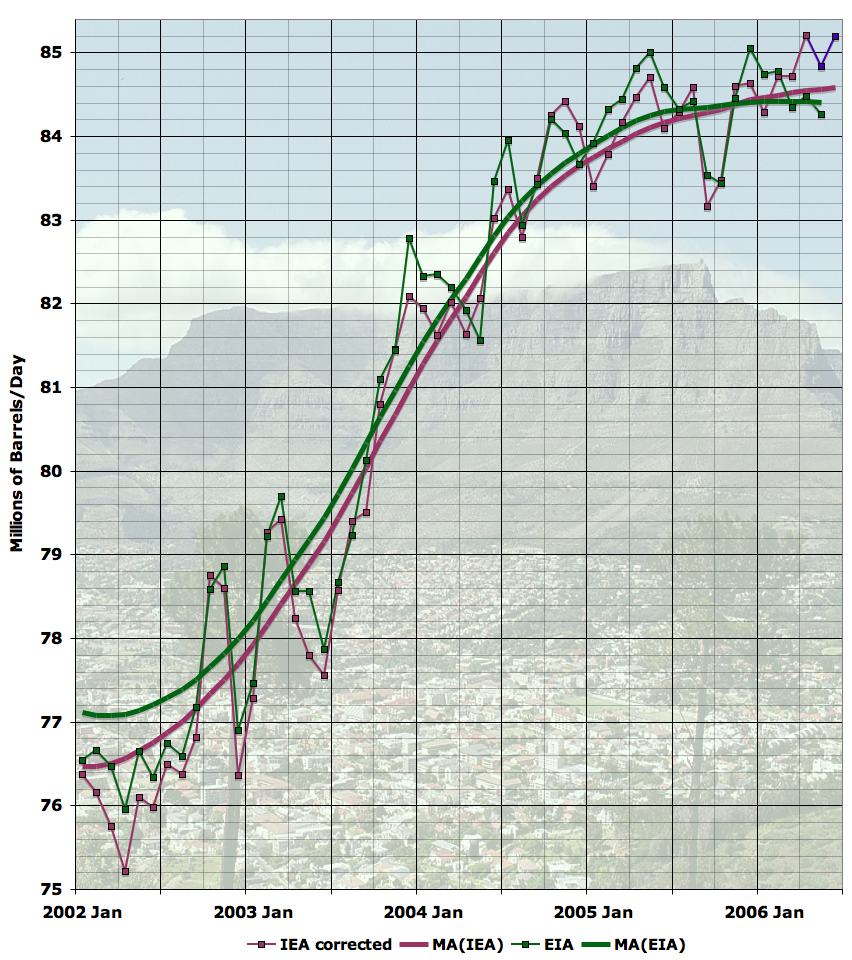Oil Peak?
As my handful of regular readers know, I think "peak oil" is a legitimate theory. Or rather, one of the 'peak oil' theories. Basically, there is a point at which the cost and difficulty of extracting oil are such that total production flatlines and declines.

I believe I'm vindicated. The following chart can be found at the Oildrum . The dataplots are from both the IEA and the EIA. The solid lines are the 13 month centered moving averages with a single recursion. Yes, it's a certainty that Katrina and the Nigerian reductions are part of this, but in counter I'll note that the peak oil scoffers claim that there's still a buffer in other nation capacities that would make up any shortfall. Nobody made up the shortfall, and they've had plenty of time.
This, by the way, is not counting this weekend's announcement of the shutdown of Prudhoe Bay - well, half of it. That's a 400,000 b/d drop, which in turn is about half a percent of global production. Which isn't a lot, really. Oh, and all these things that are causing reduced production - Katrina and Nigeria and Prudhoe and Iraq - will in turn mean that the peak will last longer. But I think it pretty apparent that we have a peak. Or at least a plateau despite demand.
I'm a cornucopiast instead of being a malthusian. I honestly believe that we have a relatively untapped or non-finite resource - human ingenuity - that CAN correct for finite resource difficulties. I believe that eventually we'll develop one of the current borderline energy sources to overcome the peak oil problem - just as we overcame the wood shortage and the difficulties of coal, as well as various food production issues. I also believe that we'll do it when we're pushed, which means the time of transition will be ugly and painful. And undoubtedly full of setbacks and confusion.
Fasten your seatbelts, it's going to be a bumpy ride.
==UPDATE==
A reader informed me that the chart was too short to be definitive - that I needed to go back 50 years to demonstrate the legitimacy. Well, I went back to 1990 - the earliest for which I could get data (the IEA wasn't even in existance in 1956) and pulled and ran the numbers. With the moving average in place there is no change. There's a brief flattening around 1996, but nothing like this.
Now it may not be peak oil - that is, the point at which we are producing as much as we can. It may be a global conspiracy by all the oil producers or oil companies or both. After all, a similar effect is going to show up in the OPEC Shutdown period. But the fact is that oil production rates have quit increasing. And given the amount of money to be had, I can't think of a reason for a conspiracy to do that -- excluding the difficulty of keeping it quiet with that many actors.

I believe I'm vindicated. The following chart can be found at the Oildrum . The dataplots are from both the IEA and the EIA. The solid lines are the 13 month centered moving averages with a single recursion. Yes, it's a certainty that Katrina and the Nigerian reductions are part of this, but in counter I'll note that the peak oil scoffers claim that there's still a buffer in other nation capacities that would make up any shortfall. Nobody made up the shortfall, and they've had plenty of time.
This, by the way, is not counting this weekend's announcement of the shutdown of Prudhoe Bay - well, half of it. That's a 400,000 b/d drop, which in turn is about half a percent of global production. Which isn't a lot, really. Oh, and all these things that are causing reduced production - Katrina and Nigeria and Prudhoe and Iraq - will in turn mean that the peak will last longer. But I think it pretty apparent that we have a peak. Or at least a plateau despite demand.
I'm a cornucopiast instead of being a malthusian. I honestly believe that we have a relatively untapped or non-finite resource - human ingenuity - that CAN correct for finite resource difficulties. I believe that eventually we'll develop one of the current borderline energy sources to overcome the peak oil problem - just as we overcame the wood shortage and the difficulties of coal, as well as various food production issues. I also believe that we'll do it when we're pushed, which means the time of transition will be ugly and painful. And undoubtedly full of setbacks and confusion.
Fasten your seatbelts, it's going to be a bumpy ride.
==UPDATE==
A reader informed me that the chart was too short to be definitive - that I needed to go back 50 years to demonstrate the legitimacy. Well, I went back to 1990 - the earliest for which I could get data (the IEA wasn't even in existance in 1956) and pulled and ran the numbers. With the moving average in place there is no change. There's a brief flattening around 1996, but nothing like this.
Now it may not be peak oil - that is, the point at which we are producing as much as we can. It may be a global conspiracy by all the oil producers or oil companies or both. After all, a similar effect is going to show up in the OPEC Shutdown period. But the fact is that oil production rates have quit increasing. And given the amount of money to be had, I can't think of a reason for a conspiracy to do that -- excluding the difficulty of keeping it quiet with that many actors.

0 Comments:
Post a Comment
<< Home